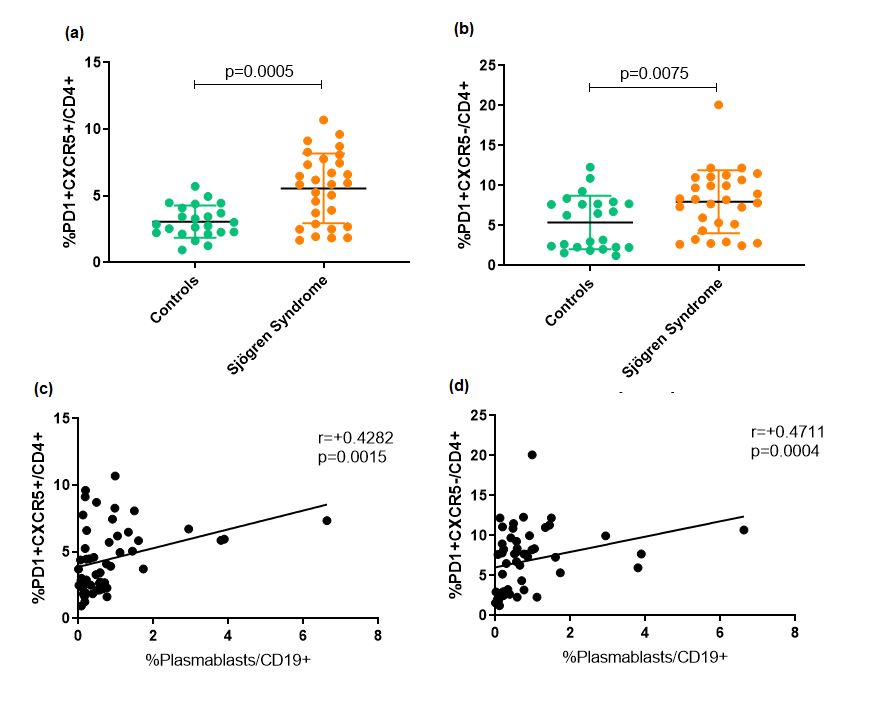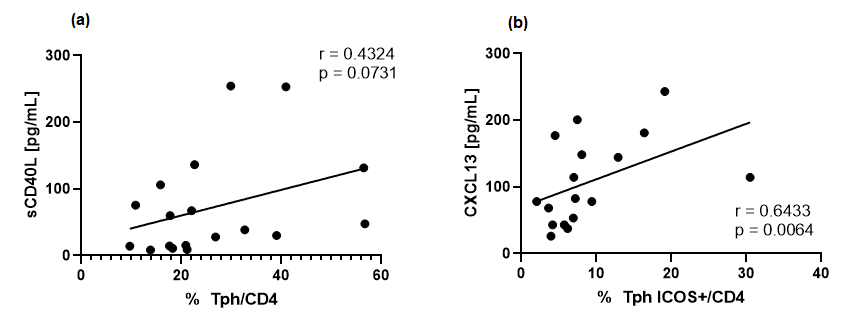Session Information
Session Type: Poster Session (Tuesday)
Session Time: 9:00AM-11:00AM
Background/Purpose: Primary Sjögren’s Syndrome (pSS) is a rare systemic autoimmune disease characterized by a dysregulation of cellular and humoral immunity, leading to a hyper-activation of B cells.
We looked if increase in T follicular helper cells (Tfh) (CD4+PD1+CXCR5+) or T peripheral helper (Tph) cells (CD4+PD1+CXCR5-), as well as cytokines involved in the cross-talk between T and B cells (CXCL-13, soluble CD40L (sCD40L)) could be involved in this B-cell activation.
Methods: We studied two cohorts of patients recruited in the Sjögren reference center of Paris-Sud university (23 controls/29 pSS and 14 controls/18 pSS, respectively). All patients had a diagnosis of pSS according to the ACR/EULAR 2016. Mass cytometry (CYTOF) and flow cytometry were used to quantify circulating cell populations. Cytokines were measured by MULTIPLEX.
Results: We showed a peripheral expansion of Tfh (CD4+PD1+CXCR5+) in patients with pSS compared to controls in flow cytometry and mass cytometry (CYTOF): 5.6 +/- 2.6% vs 3.1 +/- 1.2% (p=0.0005) and 10.2 +/- 5.8% vs 6.3 +/- 3.3% (p=0.0349), respectively. Similarly, patients with pSS had higher blood levels of Tph (CD4+PD1+CXCR5-) with both techniques: 8.0 +/- 4.0% vs 5.4 +/- 3.3% (p=0.0075) and 27.3 +/- 13.8% vs 14.9 +/- 9.3% (p=0.0045), respectively. Activated Tph assessed by ICOS expression (CD4+PD1+CXCR5-ICOS+) were also higher in pSS patients: 9.6 +/- 7.1% versus 4.4 +/- 3.3% (p=0.0037).
There was a positive correlation between plasmablasts (CD19+CD27+CD38hi) and Tfh levels (r=+0.43, p=0.0015) and Tph levels (r =+0.47, p=0.0004) in CYTOF.
Patients with pSS also had a trend in favor of a higher level of CXCL13 and soluble CD40L compared to controls: 148.8 +/- 186.2 pg / mL vs 130.5 +/- 207.2 pg / mL (p=0.0846) and 69.9 +/- 70.2 pg / mL mL vs 34.3 +/- 28.2 pg / mL (p=0.0802). There was a positive correlation between Tph and soluble CD40L (r=+0.43, p=0.07) and between activated Tph (CD4+PD1+CXCR5-ICOS+) and CXCL13 (r=+0.64, p< 0.05) in patients with pSS.
Conclusion: Circulating Tfh and Tph T-cell subsets play a role in the hyper-activation of B cells in pSS. Therefore, inhibition of Tfh/Tph function or of cytokines involved in their cross-talk with B cells (CXCL13, CD40L) seems promising therapeutic perspectives in pSS.
To cite this abstract in AMA style:
Dupré A, Pascaud J, Rivière E, Mingueneau M, Nocturne G, Mariette X. Role of T Follicular Helper Cells and T Peripheral Helper Cells in the Activation of B Cells in Sjögren Syndrome [abstract]. Arthritis Rheumatol. 2019; 71 (suppl 10). https://acrabstracts.org/abstract/role-of-t-follicular-helper-cells-and-t-peripheral-helper-cells-in-the-activation-of-b-cells-in-sjogren-syndrome/. Accessed .« Back to 2019 ACR/ARP Annual Meeting
ACR Meeting Abstracts - https://acrabstracts.org/abstract/role-of-t-follicular-helper-cells-and-t-peripheral-helper-cells-in-the-activation-of-b-cells-in-sjogren-syndrome/


